List of Daimler cars
The following is a list of motor cars manufactured by the Daimler Company and its successors.
Veteran (prior to 1904)
All Veteran Daimlers had side valves and chain drive except the Critchley Light car, which had belt drive.
| List of Veteran Daimler cars | |||||||||
|---|---|---|---|---|---|---|---|---|---|
| Hp rating | Duration of production | Engine configuration and displacement | Bore (mm) | Stroke (mm) | Notes | Image | |||
| 3½[1] | Before 1903[note 1] | straight-twin, ~1100 cc | 76.2 (3") | 114.3 (4½") | Critchley Light car[2] | ||||
| 4½[1] | Before 1903[note 1] | straight-twin, 1527 cc | 90 | 120 | |||||
| 6[1] | Before 1903[note 1] | straight-twin, 1551 cc | 90.5 | 120.5 | The first Royal car; "mail phaeton" body, purchased by the Prince of Wales in 1900. Another bought in 1900 with shooting brake body [note 2][3] |  | |||
| 9[1] | Before 1903[note 1] | straight-twin, 1804 cc | 94 | 130 | |||||
| 8[1] | Before 1903[note 1] | straight-four, 3054 cc | 90 | 120 | |||||
| 16/18[1] | Before 1903[note 1] | straight-four, 3308 cc | 90 | 130 | |||||
| 12[1] | Before 1903[note 1] | straight-four, 3402 cc | 95 | 120 | |||||
| 14[1] | 1901-1903[note 3][3] | straight-four engine, 2324 cc | 86 | 100 | 1901 Royal car (TA12) to Edward VII, wagonette body[3] | ||||
| 22[1] | Before 1903[note 1] | straight-four engine, 4503 cc | 105 | 130 | 1903 Royal cars (TB22 and TC22) to Edward VII[3] 1904 Royal car (TB22) to the Prince of Wales[3] |
.jpg) | |||
| 7[1] | 1904 | straight-twin, 1773 cc | 97 | 120 | |||||
| 16/20[1] | 1904-1905 | straight-four, 3309 cc | 90 | 130 | |||||
| 18/22[1] | 1904-1905 | straight-four, 3827 cc | 95 | 135 | |||||
| 28/36[1] | 1904-1906 | straight-four engine, 5,703 cc | 110 | 150 | 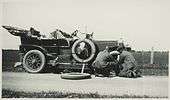 | ||||
Edwardian (1905-1918)
During the Edwardian era, Daimler licensed and developed the Knight sleeve-valve system. Also during this era, Daimler switched from chain to shaft drive, first using conventional bevel gears, and then, from 1909, using worm gears.
| List of Edwardian Daimler cars | |||||||||
|---|---|---|---|---|---|---|---|---|---|
| Hp rating | Duration of production | Engine configuration and displacement | Bore (mm) | Stroke (mm) | Valve configuration | Final drive type | Notes | Image | |
| 30/40[1] | 1905-06 | straight-four, 7247 cc | 124 | 150 | side valve | chain[3] | 1905 Royal car (TJ) to the Prince of Wales[3] | ||
| 35[1] | 1906-07[1] | straight-four, 8462 cc | 134[3] | 150 | side valve | chain[3] | 1905 Royal car (TK) to Edward VII, limousine[3] | ||
| 45[1] | 1906 | straight-four, 10,604 cc | 150 | 150 | side valve | ||||
| 17[1] | 1907 | straight-four, 3817 cc | 90 | 150 | side valve | chain | |||
| 28[1] | 1907 | straight-four, 6786 cc | 120 | 150 | side valve | chain | 1904 Royal car (TB) to Edward VII[3] | ||
| 30[4] | 1907 | straight-four, 7965 cc | 130 | 150 | side valve | chain | 1908 Royal car (TC42) to the Prince of Wales[3] | ||
| 35[4] | 1907 | straight-four, 9237 cc | 140 | 150 | side valve | chain | 1905 Royal car (TK) to the Prince of Wales; 1907 Royal car to Edward VII, landaulet[3] |
||
| 30[4] | 1908 | straight-four, 4942 cc | 110 | 130 | side valve | chain | 1907 Royal car (TO) to Edward VII, brake[3] | ||
| 36[4] | 1908 | straight-four, 6787 cc[note 4] | 110 | 150 | side valve | ||||
| 38[4] | 1908-1913 | straight-four, 6281 cc | 124 | 130 | side valve[4] sleeve valve[3] |
bevel | 1909 Royal car (TC) to the Prince of Wales, limousine[3] | ||
| 42[4] | 1908-? | straight-four, 7695 cc | 130 | 150 | side valve[4] | bevel | |||
| 48[4] | 1908-1909 | straight-four, 9237 cc | 140 | 150 | side valve[4] | _(2).jpg) | |||
| 58[4] | 1908 | straight-four, 10,431 cc | 154 | 140 | side valve[4] sleeve valve[3] |
chain | 1908 Royal car (TC) to Edward VII, landaulet; 1908 Royal car (TL) to Queen Alexandra[3] |
||
| 22[4] | 1909-1910 | straight-four, 3764 cc | 96 | 130 | sleeve valve[4] | see also Rover 12 | 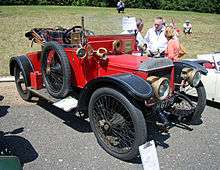 | ||
| 33[4] | 1909-1910 | straight-six, 5616 cc | 96 | 130 | sleeve valve[4] | ||||
| 56[note 5][4] | 1909-1911 | straight-six, 9421 cc[4] | 124 | 130 | side valve[4] sleeve valve[3][5] |
bevel[3][5] worm[5] |
Royal cars:
|
 | |
| 15[4] | 1910-1912 | straight-four, 2614 cc | 80 | 130 | sleeve valve | .jpg) | |||
| 12[4] | 1911-? | straight-four, 1705 cc | 69 | 114 | sleeve valve | ||||
| 25[4] | 1911-1912 | straight-four, 4208 cc | 101 | 130 | sleeve valve |  | |||
| 23[4] | 1911-12 | straight-six, 3921 cc | 80 | 130 | sleeve valve | bevel[5] | 1911 Royal car (TA) to George V[5] | ||
| 38[4] | 1911-12 | straight-six, 6252 cc | 101 | 130 | sleeve valve | ||||
| 20[4] | 1912-1915 | straight-four, 3309 cc | 90 | 130 | sleeve valve | worm[5] | 1914 Royal car (TO) to George V, ambulance[5] | ||
| 30[4] | 1912-1915 | straight-six, 4963 cc | 90 | 130 | sleeve valve | ||||
| 26[4] | 1913 | straight-four, 4576 cc | 102 | 140 | sleeve valve | ||||
| 40[4] | 1913 | straight-six, 6864 cc | 102 | 140 | sleeve valve | ||||
| 30[6] | 1914-15 | straight-four, 4942 cc | 110 | 130 | sleeve valve |  | |||
| 45[6] | 1915 | straight-six, 7410 cc | 110 | 130 | sleeve valve | worm[5] | 1914 Royal car (TB) to George V, brougham[5] | ||
Vintage (1919-1930)
All Vintage Daimlers had sleeve valves and worm final drive.
| List of Vintage Daimler cars | |||||||||
|---|---|---|---|---|---|---|---|---|---|
| Hp rating | Duration of production | Engine configuration and displacement | Bore (mm) | Stroke (mm) | Notes | Image | |||
| 30[6] | 1920-1925 | straight-six, 4962 cc | 90 | 130 | 1920 Royal car (TL) to George V[5] | ||||
| 45[6] | 1920 | straight-six, 7413 cc | 110 | 130 | 1923 Royal car (TJ) to George V, brake[5] |  | |||
| 20[6] | 1922 | straight-four, 3308 cc | 90 | 130 | |||||
| 12[6] | 1923 | straight-six, 1542 cc | 59 | 94 | |||||
| 16[6] | 1923 | straight-six, 2165 cc | 66.5 | 104 | |||||
| 21[6] | 1923-1925 | straight-six, 3021 cc | 75 | 114 |  | ||||
| 57[6] | 1923-1925 | straight-six, 9420 cc | 124 | 130 | These cars were made only for selected buyers and were not offered to the public[7] |  | |||
| 16, 16/55[6] | 1924-1929 | straight-six, 1872 cc | 65 | 94 |  | ||||
| 20, 20/70[6] | 1924-1929 | straight-six, 2648 cc | 73.5 | 104 | 1924 Royal car (C) to George V, limousine[5] | ||||
| 25, 25/85[6] | 1924-1930 | straight-six, 3568 cc | 81.5 | 114[5] | 1929 Royal car (V) to George V, brougham[5] | ||||
| 35, 35/120[6] | 1924-1932 | straight-six, 5764 cc | 97 | 130 | 1926 Royal car (R) to George V, limousine[5] | _(1280x853).jpg) | |||
| 45[8] | 1925 | straight-six, 8458 cc | 117.5 | 130 | 1925 Royal car (N) to George V, limousine[5] Daimler claimed the 45 to be the largest production car in the world[9] |
||||
| 50 "Double-Six"[8] | 1927-1930 | V12, 7136 cc | 81.5 | 114 | |||||
| 30 "Double-Six"[8] | 1928-1932 | V12, 3744 cc | 65 | 94 | Royal cars: | .jpg) | |||
1930s
Daimler had introduced their patented Daimler Fluid Flywheel matched with Wilson preselector gearboxes across the range by the beginning of this decade. New engines returned to poppet valves, worm final drive continued throughout the decade into the 1950s.
| List of 1930s Daimler cars | |||||||||
|---|---|---|---|---|---|---|---|---|---|
| Model or RAC hp rating | Duration of production | Engine configuration and displacement | Bore (mm) | Stroke (mm) | Valve configuration | Notes | Image | ||
| 20/30[8] | 1931-1934 | straight-six, 3568 cc | 81.5 | 114 | sleeve valve | ||||
| 30/40[8] | 1931-1935 | V12, 5296 cc | 73.5 | 104 | sleeve valve | ||||
| 40/50[8] | 1931-1935 | V12, 6511 cc | 81.5 | 104 | sleeve valve | Royal cars:
| |||
| 16/20[8] | 1932-1933 | straight-6, 2648 cc | 73.5 | 105 | sleeve valve | ||||
| 20/25[8] | 1932 | straight-6, 3568 cc | 81.5 | 114 | sleeve valve | ||||
| 15[8] | 1933-1934 | straight-6, 1705 cc | 63.5 | 90 | overhead valve | _(15818775260).jpg) | |||
| 15[8] | 1934-1936 | straight-6, 2003 cc | 63.5 | 105 | overhead valve | .jpg) | |||
| 20[8] | 1934-1936 | straight-6, 2443 cc or 2887 cc | 72 | 100 or 110 | overhead valve | ||||
| 25[8] | 1935 | straight-8, 3746 cc | 72 | 115 | overhead valve | 1935 Royal car to the Household of George V, limousine[5] |  | ||
| Light 20[8] | 1936-1940 | straight-6, 2565 cc | 72 | 105 | overhead valve | ||||
| Light Straight 8[8] | 1936-1938 | straight-8, 3421 cc | 72 | 105 | overhead valve | ||||
| 4 Litre[8] | 1938-1940 | straight-8, 3960 cc | 77.4 | 105 | overhead valve | bored out Light Straight Eight rigid front axle with semi-elliptic springs |
 | ||
| 4½ Litre Straight 8[8] | 1936-1940 | straight-8, 4624 cc | 80 | 115 | overhead valve | Royal cars:
rigid front axle with semi-elliptic springs |
  | ||
| 24[8] | 1936-1940 | straight-6, 3317 cc | 80 | 110 | overhead valve |
|
_(cropped).jpg) | ||
| 15[8] | 1937 | straight-6, 2166 cc | 66 | 105.4 | overhead valve | independent front suspension |  | ||
| Double Six[8] | 1937 | V12, 6511 cc | 81.5 | 104 | overhead valve | rigid front axle with semi-elliptic springs | |||
| 15[8] | 1938-1940 | straight-6, 2522 cc | 69.6 | 110.5 | overhead valve | independent front suspension |  | ||
Military vehicles
| List of Daimler military vehicles | |||||||||
|---|---|---|---|---|---|---|---|---|---|
| Model | Duration of production | Engine configuration and displacement | Weight (metric tons) | Main armament | Notes | Image | |||
| Daimler Scout | 1938–1945 | straight-6, 2522 cc | 3 | .303 in Bren gun or .55 in Boys Anti-tank Rifle | 4-wheel drive known to the Army as Dingo, made at J C Bamford Uttoxeter. | ||||
| Daimler Armoured Car | 1940– ? | straight-6, 4095 cc | 7.6 | 2 pounder QF | all-wheel-drive |  | |||
| Ferret Scout Car | 1952–1971 | Rolls-Royce B60 ioe straight-6 | 3.7 | 7.62×51mm NATO GPMG or .30 M1919 Browning machine gun |  | ||||
Post-WWII BSA (1945-1960)
Daimler returned to bevel gear final drive with the big cars of 1946 and later replaced their fluid flywheel and epicyclic gearbox with Borg-Warner automatic transmissions.
| List of post-WWII Daimler cars, 1945-1960 | |||||||||
|---|---|---|---|---|---|---|---|---|---|
| Model or RAC hp rating | Duration of production | Engine configuration and displacement | Bore (mm) | Stroke (mm) | Number made[11] | Notes | Image | ||
| DB18[12] | 1939-1950 | straight-6, 2522 cc | 69.6 | 110.5 | 3355 | Chassis developed from pre-war New Fifteen, engine developed from the Daimler Scout Car's engine.[13] This chassis carried the first of Hooper's sweeping Empress style |
  | ||
| DE27[12] | 1946–1951 | straight-6, 4095 cc | 85.09 | 120.015 | 255 | Engine developed from the Daimler Armoured Car's engine. Daimler's ambulance of this period was based on this chassis. First Daimler with bevel gear final drive since the Edwardian era. Early use of electrically-operated windows and centre divider.[14] |
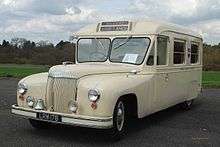 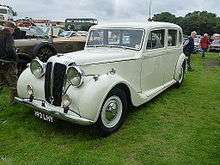 | ||
| DE36[12] | 1946–1953 | straight-8, 5460 cc | 85.09 | 120.015 | 205 | Daimler's last straight-eight Extended DE27 chassis.[14] last State Car by Daimler |
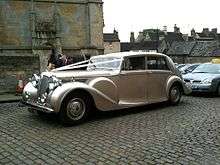 .jpg) | ||
| Special Sports[12] | 1948-1953 | straight-6, 2522 cc | 69.6 | 110.5 | 608[note 7] | DB18 drophead coupé by Barker; also available with Hooper Empress saloon body[15] |  | ||
| DB18 Consort[12] | 1949-1953 | straight-6, 2522 cc | 69.6 | 110.5 | 4250 | DB18 saloon, updated bodywork |  | ||
| Regency[12] | 1951-1952 | straight-6, 2952 cc | 76.2 | 108.0 | 51,[16] also see Regency Mk III | ||||
| Conquest[17] | 1953-1956 | straight-6, 2433 cc | 76.2 | 88.9 | 4568[18] |  | |||
| Conquest Roadster[17] | 1953-1956 | straight-6, 2433 cc | 76.2 | 88.9 | 119 | Sports car based on the Conquest with an uprated engine[19] | .jpg) | ||
| Conquest Century[17] | 1954-1956 | straight-6, 2433 cc | 76.2 | 88.9 | 4818 (saloon)[18] 234 (drophead)[20] |
Saloon or drophead with the Roadster engine |  | ||
| Regina[12] | 1954-1956 | straight-6, 4617 cc | 95.2 | 108.0 | see DK400[note 8] | Replacement for the DE27 and DE36; long-wheelbase Regency[20] | |||
| Regency Mk II[12] | 1954-1955 | straight-6, 3468 cc | 82.6 | 108.0 | See Regency Mk III | 3½ litre Regency |  | ||
| Regency Mk III[12] | 1954-1956 | straight-6, 4617 cc | 95.2 | 108.0 | 560[note 9] | 4½ litre Regency | |||
| Sportsman[12] | 1954-1955 | straight-6, 3468 cc | 82.6 | 108.0 | See Regency Mk III | 3½ litre Regency sports saloon |  | ||
| One-O-Four (104)[17][21] | 1954-1955[17] | straight-6, 3468 cc | 82.6 | 108.0 | See Regency Mk III | Renamed, uprated Regency; supposedly capable of 104 mph (167 km/h)[22] | 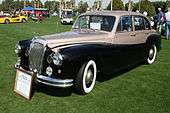 | ||
| DK400[17] | 1956-1960 | straight-6, 4617 cc | 95.2 | 108.0 | 132[note 8] | Renamed Regina with Carbodies standard steel limousine body,[23] last production Daimler car with fluid flywheel transmission[24] car illustrated has Hooper Empress limousine body |
 | ||
| Majestic[17] | 1958-1962[11] | straight-6, 3794 cc | 83.4 | 108.0 | 1490 | Restyled 104 with bigger bore,[17] Borg-Warner automatic transmission, and 4-wheel disc brakes[25] |  | ||
| Majestic Major DQ450[26] | 1959–1968[11] | V8, 4561 cc[17] | 95.2 | 80.0 | 1180 | Majestic with 4.5 litre V8 engine[26] |  | ||
| SP250[17] | 1959-1964 | V8, 2547 cc | 76.2 | 69.8 | 2645 | Fibreglas-bodied V8 sports car |  | ||
| Daimler DR450[27] | 1961–1967[28] | ohv V8, 4561 cc | 95.2 | 80.0 | 864 | Limousine variant of Majestic Major;[29] the last Daimler car not based on a Jaguar.[27] |  | ||
Owned by Jaguar (1960-1966)
BSA sold Daimler to Jaguar in 1960. Development of Daimler cars continued, but some "Daimler-ised" Jaguars were introduced as well.
| List of Daimler cars under Jaguar Cars ownership, 1960-1966 | |||||||||
|---|---|---|---|---|---|---|---|---|---|
| Model | Duration of production | Engine configuration and displacement | Base vehicle | Number made[11] | Notes | Image | |||
| Daimler 2.5 V8 and V8-250 | 1962–1968[17] | ohv V8, 2547 cc | Jaguar Mark 2 | 17,620 | Basically a luxury-appointed Jaguar Mark 2 with a SP250 engine and a Daimler grille; greatest production of any Daimler model;[30] last Daimler not to use a Jaguar engine. | ||||
| Daimler Sovereign[28][31] XJ16 | 1966–1969[28] | dohc straight-6, 4235 cc | Jaguar 420 | 5,824[31] | Jaguar 420 with better finishes and Daimler grille and badges,[17][31] intermediate model between the 2.5 V8 and the Majestic Major[31] |  | |||
Owned by BMC/BMH/British Leyland/Austin Rover (1966-1984)
| List of Daimler cars under the ownership of BMC and its successors, 1966-1984 | |||||||||
|---|---|---|---|---|---|---|---|---|---|
| Model | Duration of production | Engine configuration and displacement | Base vehicle | Notes | Image | ||||
| Daimler DS420[32] Limousine | 1968–1992[28] | dohc straight-6, 4235 cc | Jaguar 420G | Successor to the DR450 and to BMC's Vanden Plas Princess, based on a lengthened Jaguar 420G floorpan with a completely new body;[32] last Daimler without a corresponding Jaguar version, last production car to use the Jaguar XK6 engine[33] | .jpg) | ||||
| Daimler Sovereign | 1969–1983 | dohc straight-6, 2791 cc[note 10] or 4235 cc[28] | Jaguar XJ6 | Jaguar XJ6 with better finishes and Daimler grille and badges[17] | |||||
| Daimler Double-Six[28] | 1972–1992 | sohc V12, 5343 cc[28] | Jaguar XJ12 | Jaguar XJ12 with better finishes and Daimler grille and badges[17] |  | ||||
Owned by Jaguar (1984-1989)
- 1986–1992 Daimler XJ40 new car and new engine as prescribed by British Leyland, the 1986 XJ40 Jaguar body could not accept Jaguar's V12 engine
- 1992–1994 Daimler Majestic XJ340 wheelbase extended 5 inches (130 mm); 3.2- and 4-litre engines
- 1992–1994 Daimler Majestic Double-Six XJ381 6-litre engine. Intended to take 75% of group V12 sales
Owned by Ford (1989-2007)
- 1994–2002 Daimler X300 and X330 body returns to a more recognisable shape. V8 from 1997
- 1996 Daimler Century limited edition: 50 V12, 50 straight 6; marking 100 years of Daimler Coventry
- 2002–2005 Daimler Super V8 X350 V8 engine, alloy structure
- 2005 Daimler Super Eight
Notes
- 1 2 3 4 5 6 7 8 Culshaw and Horrobin are not specific about Daimler's production dates between 1896 and 1902.
- ↑ Montagu and Burgess-Wise refer to these cars as 6 hp, but the engine dimensions they give correspond to those of the 4½ hp as given in Culshaw and Horrobin.
- ↑ Culshaw and Horrobin list this car as being produced only in 1903, but Montagu and Burgess-Wise list a 1901 Royal car with these dimensions.
- ↑ A four-cylinder engine with a 110 mm bore and a 150 mm stroke should have a displacement of 5702 cc
- ↑ Montagu and Burgess-White refer to this as a 57 hp car
- 1 2 One of the 1939 cars and the 1940 car were fitted with Lanchester radiators
- ↑ Combined total of Barker dropheads and Hooper saloons
- 1 2 Total production for all DK400s, including the Regina.
- ↑ Total production of all Regencys, plus the Sportsman and the One-O-Four
- ↑ The 2.8 L engine was available only until 1973
References
Citations
- 1 2 3 4 5 6 7 8 9 10 11 12 13 14 15 16 17 18 19 Culshaw and Horrobin, p. 111
- ↑ Nixon 1946, p. 222.
- 1 2 3 4 5 6 7 8 9 10 11 12 13 14 15 16 17 18 19 20 21 Lord Montagu and David Burgess-Wise, p. 295
- 1 2 3 4 5 6 7 8 9 10 11 12 13 14 15 16 17 18 19 20 21 22 23 24 25 26 27 28 Culshaw and Horrobin, p. 112
- 1 2 3 4 5 6 7 8 9 10 11 12 13 14 15 16 17 18 19 20 21 22 23 24 25 26 27 28 29 30 Lord Montagu and David Burgess-Wise, p. 296
- 1 2 3 4 5 6 7 8 9 10 11 12 13 Culshaw and Horrobin, p. 114
- ↑ Lord Montagu and David Burgess-Wise, p. 195
- 1 2 3 4 5 6 7 8 9 10 11 12 13 14 15 16 17 18 19 20 Culshaw and Horrobin, p. 115
- ↑ Lord Montagu and David Burgess-Wise, p. 195
- 1 2 3 Lord Montagu and David Burgess-Wise, p. 297
- 1 2 3 4 Sedgwick, Michael; Gillies, Mark (1998). A-Z of Cars 1945–1970. Bay View Books.
- 1 2 3 4 5 6 7 8 9 10 Culshaw and Horrobin, p. 116
- ↑ Lord Montagu and David Burgess-Wise, p. 248
- 1 2 Lord Montagu and David Burgess-Wise, p. 249
- ↑ Lord Montagu and David Burgess-Wise, p. 256
- ↑ Lord Montagu and David Burgess-Wise, p. 260
- 1 2 3 4 5 6 7 8 9 10 11 12 13 14 Culshaw and Horrobin, p. 117
- 1 2 Lord Montagu and David Burgess-Wise, p. 265
- ↑ Lord Montagu and David Burgess-Wise, p. 264
- 1 2 Lord Montagu and David Burgess-Wise, p. 266
- ↑ Culshaw and Horrobin, p. 113
- ↑ Lord Montagu and David Burgess-Wise, p. 269
- ↑ Lord Montagu and David Burgess-Wise, p. 267
- ↑ Lord Montagu and David Burgess-Wise, p. 271
- ↑ Lord Montagu and David Burgess-Wise, p. 272
- 1 2 Lord Montagu and David Burgess-Wise, p. 275
- 1 2 Lord Montagu and David Burgess-Wise, p. 282
- 1 2 3 4 5 6 7 Culshaw and Horrobin, p. 118
- ↑ Lord Montagu and David Burgess-Wise, pp. 280-281
- ↑ Lord Montagu and David Burgess-Wise, p. 279
- 1 2 3 4 Lord Montagu and David Burgess-Wise, p. 283
- 1 2 Lord Montagu and David Burgess-Wise, pp. 284-285
- ↑ Lord Montagu and David Burgess-Wise, p. 292
Sources
- Culshaw, David; Horrobin, Peter (2013) [1974]. "Daimler". The Complete Catalogue of British Cars 1895 - 1975 (e-book ed.). Poundbury, Dorchester, UK: Veloce Publishing. pp. 109–118. ISBN 978-1-845845-83-4.
- Douglas-Scott-Montagu, Edward John Barrington & Burgess-Wise, David (1995). "Appendix: The Pre-War Royal Daimlers". Daimler Century: The full history of Britain's oldest car maker. Foreword by HRH The Duke of Edinburgh. Sparkford, Nr Yeovil, Somerset, UK: Patrick Stephens. pp. 295–297. ISBN 1 85260 494 8.
- Nixon, St. John C. (1946), Daimler 1896 to 1946: 50 Years of the Daimler Company, G.T. Foulis & Co.
- Sedgwick, Michael; Gillies, Mark (1998). A-Z of Cars 1945–1970. Bay View Books.